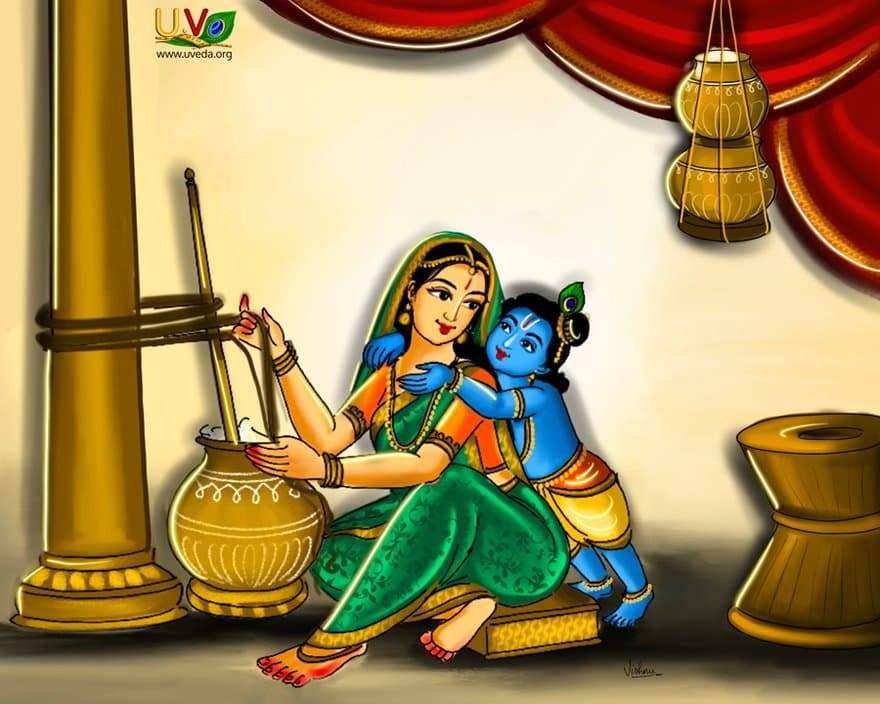Chapter 9
Kannan embracing Yashoda - (வட்டு நடுவே)
புறம் புல்கல்

A child enjoys running and hugging his mother’s back. The mother enjoys it as well. Similarly, Kannan would slowly walk behind His mother, without making any sound, without her spotting Him and hug her from behind. Āzhvār wishes to enjoy the way Yashoda enjoyed that moment.
Pravēśam (Introduction)
In the preceding thirumozhi (divine verses),
குழந்தை ஓடி வந்து தாயின் முதுகைக் கட்டிக்கொண்டு மகிழும்; தாயும் மகிழ்வாள். கண்ணனும் தாய்க்குத் தெரியாமல் பின்புறத்தே மெல்ல நடந்து வந்து தாயின் முதுகைக் கட்டிக்கொள்வான். அந்நிலையை விரும்பி யசோதை மகிழ்ந்ததுபோல் ஆழ்வார் தாமும் விரும்புகிறார்.
Verses: 108 to 117
Grammar: Veṇṭaḷaiyālvanta Kaliththāḻisai, Taravu Kocchakakkalippā (117) / வெண்டளையால்வந்த கலித்தாழிசை, தரவு கொச்சகக்கலிப்பா (117)
Recital benefits: Will get good children and live happily
- PAT 1.9.1
108 ## வட்டு நடுவே * வளர்கின்ற * மாணிக்க
மொட்டு நுனையில் * முளைக்கின்ற முத்தே போல் **
சொட்டுச் சொட்டு என்னத் * துளிக்கத் துளிக்க * என்
குட்டன் வந்து என்னைப் புறம்புல்குவான் *
கோவிந்தன் என்னைப் புறம்புல்குவான் (1) - PAT 1.9.2
109 கிண்கிணி கட்டிக் * கிறி கட்டிக் * கையினில் *
கங்கணம் இட்டுக் * கழுத்தில் தொடர் கட்டி **
தன் கணத்தாலே * சதிரா நடந்து வந்து *
என் கண்ணன் என்னைப் புறம்புல்குவான் *
எம்பிரான் என்னைப் புறம்புல்குவான் (2) - PAT 1.9.3
110 கத்தக் கதித்துக் * கிடந்த பெருஞ்செல்வம் *
ஒத்துப் பொருந்திக்கொண்டு * உண்ணாது மண் ஆள்வான் **
கொத்துத் தலைவன் * குடிகெடத் தோன்றிய *
அத்தன் வந்து என்னைப் புறம்புல்குவான் *
ஆயர்கள் ஏறு என் புறம்புல்குவான் (3) - PAT 1.9.4
111 நாந்தகம் ஏந்திய * நம்பி சரண் என்று *
தாழ்ந்த தனஞ்சயற்கு ஆகி * தரணியில் **
வேந்தர்கள் உட்க * விசயன் மணித் திண்தேர் *
ஊர்ந்தவன் என்னைப் புறம்புல்குவான் *
உம்பர்கோன் என்னைப் புறம்புல்குவான் (4) - PAT 1.9.5
112 வெண்கலப் பத்திரம் கட்டி * விளையாடி *
கண் பல செய்த * கருந்தழைக் காவின் கீழ் **
பண் பல பாடிப் * பல்லாண்டு இசைப்ப * பண்டு
மண் பல கொண்டான் புறம்புல்குவான் *
வாமனன் என்னைப் புறம்புல்குவான் (5) - PAT 1.9.6
113 சத்திரம் ஏந்தித் * தனி ஒரு மாணியாய் *
உத்தர வேதியில் * நின்ற ஒருவனை **
கத்திரியர் காணக் * காணி முற்றும் கொண்ட *
பத்திராகாரன் புறம்புல்குவான் *
பார் அளந்தான் என் புறம்புல்குவான் (6) - PAT 1.9.7
114 பொத்த உரலைக் கவிழ்த்து * அதன்மேல் ஏறி *
தித்தித்த பாலும் * தடாவினில் வெண்ணெயும் **
மெத்தத் திருவயிறு * ஆர விழுங்கிய *
அத்தன் வந்து என்னைப் புறம்புல்குவான் *
ஆழியான் என்னைப் புறம்புல்குவான் (7) - PAT 1.9.8
115 மூத்தவை காண * முது மணற்குன்று ஏறி *
கூத்து உவந்து ஆடிக் * குழலால் இசை பாடி **
வாய்த்த மறையோர் வணங்க * இமையவர்
ஏத்த வந்து என்னைப் புறம்புல்குவான் *
எம்பிரான் என்னைப் புறம்புல்குவான் (8) - PAT 1.9.9
116 கற்பகக் காவு * கருதிய காதலிக்கு *
இப்பொழுது ஈவன் என்று * இந்திரன் காவினில் **
நிற்பன செய்து * நிலாத் திகழ் முற்றத்துள் *
உய்த்தவன் என்னைப் புறம்புல்குவான் *
உம்பர்கோன் என்னைப் புறம்புல்குவான் (9) - PAT 1.9.10
117 ## ஆய்ச்சி அன்று * ஆழிப் பிரான் புறம்புல்கிய *
வேய்த் தடந்தோளி சொல் * விட்டுசித்தன் மகிழ்ந்து **
ஈத்த தமிழ் இவை * ஈரைந்தும் வல்லவர் *
வாய்த்த நன்மக்களைப் பெற்று * மகிழ்வரே (10)